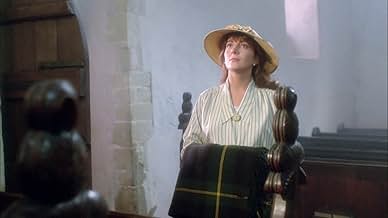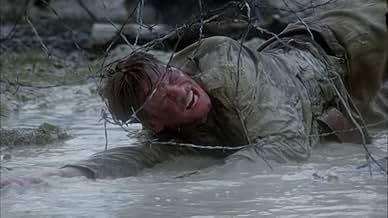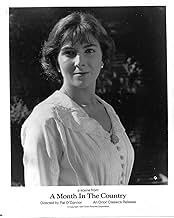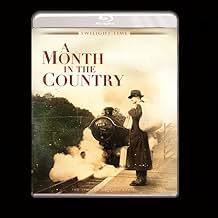IMDb RATING
6.8/10
2.2K
YOUR RATING
Two soldiers (Colin Firth, Kenneth Branagh) recover from World War I while spending a summer in a Yorkshire village.Two soldiers (Colin Firth, Kenneth Branagh) recover from World War I while spending a summer in a Yorkshire village.Two soldiers (Colin Firth, Kenneth Branagh) recover from World War I while spending a summer in a Yorkshire village.
- Awards
- 1 win & 1 nomination total
Ken Kitson
- Mr. Sykes
- (as Kenneth Kitson)
- Director
- Writers
- All cast & crew
- Production, box office & more at IMDbPro
Featured reviews
I've just watched this haunting movie for the second time, after an interval of several years and having just read the book on which it's based. I feel as though the director,actors, cinematographer took a walk inside my head to pluck the images that lived there as I read the book. Of course, it was those images inside THEIR heads that have made this film the masterpiece that it is...to enrich the heart, restore the soul. Colin Firth brought the character, Tom Birkin, so fully into life, with his sensitivity, conflicts, process of restoration (both as a skilled worker and as a damaged human being) and yearnings one wonders why such roles as this haven't been offered him since. His brooding Mr Darcy in the TV version of "Pride and Prejudice" used some of these talents, but not nearly enough. Kenneth Branagh's fine understated playing of the equally war damaged archaelogist (and a closet homosexual) is amazing and brilliant, considering especially his over-the-top performances in later films. Lovely Natasha Richardson creates just the right tone of controlled longing of the unhappily married Alice Keagh. Jim Carter and the rest of the cast are splendid as well. This is a film to return to again and again for its visual and soulful beauty, simplicity and depth. What an antidote for the juvenile,frentic blockbuster fare we're offered for the most part by the movie "business."
13. A MONTH IN THE COUNTRY (drama, 1987) Birkin, a young WW1 veteran, arrives in the sleepy town of Oxgodby assigned to paint the church. He suffers from nightmares since being shell-shocked. Birkin meets the beautiful Alice (Natasha Richardson), the wife of the local pastor. Though they're immediately attracted to each other, they know they can't be together. But his love for Alice proves a happy respite from his war ravanged life.
Critique: To doze off in a sleepy afternoon watching 'A Month in the Country' feels almost like being there. This beautifully shot, nostalgic look at youth's lost moments, conjures up deeply felt emotions. The town of Oxgodby seems to exist between reality and fantasy. Slowly slumbering away in its own ambiance, unaware of the world around it. Where dreamers go, and weary travelers stumble on their way.
Pat O'Connor's doughty direction may get a bit tedious at times, but it has to be taken in the context of the film's setting (1920s England). Though some scenes do lag in pace, this does not take anything away from the film's dreamy (dark) undertones which are its strong points.
Character conflict is its weakest, however, since most of the characters react passively to the town's underhand prejudice. The best enduring quality is Birkin's lost-love relationship with both the town and Alice.
QUOTE: "God? What God? There is no God?"
Critique: To doze off in a sleepy afternoon watching 'A Month in the Country' feels almost like being there. This beautifully shot, nostalgic look at youth's lost moments, conjures up deeply felt emotions. The town of Oxgodby seems to exist between reality and fantasy. Slowly slumbering away in its own ambiance, unaware of the world around it. Where dreamers go, and weary travelers stumble on their way.
Pat O'Connor's doughty direction may get a bit tedious at times, but it has to be taken in the context of the film's setting (1920s England). Though some scenes do lag in pace, this does not take anything away from the film's dreamy (dark) undertones which are its strong points.
Character conflict is its weakest, however, since most of the characters react passively to the town's underhand prejudice. The best enduring quality is Birkin's lost-love relationship with both the town and Alice.
QUOTE: "God? What God? There is no God?"
This is a true gem of a film. Only those however who have an empathy for the destruction of World War One, and a sensitivity about how moving religious themes can be, will really appreciate the aspects of the film which make it timeless. It is deliberately slow and careful in its pace, and the contrasts between Church and Chapel, working and upper class, and social mobility makes it a film I have always found very moving. The use of the Schubert Mass as a musical backdrop at key points emphasises the cathartic journey Birkin makes. Indeed, his visit to the church as an old man demonstrates the way he has been cleansed of the mud of Flanders.
When an arm or leg is removed, the amputee can continue to 'feel' it for some time afterwards. The phantom limb can hurt, or itch, or feel cold. But nothing is truly the same.
Similarly, the First World War irrevocably altered Britain, but in its immediate aftermath we limped on, unaware (or unwilling to admit) that anything had changed. It's this brief period of denial that Month in the Country illustrates: the moment when we teetered on the edge of the 19th century before toppling into the 20th.
Consequently, while it is a film of great heartbreak and loss, it is also one of great hope and triumph of the human spirit. There is one scene that perfectly illustrates this: a little girl visits her friend, who is sick in bed. She talks about the weather and her new hat and how they'll play together when her friend gets well. Then as she walks back home she says to Colin Firth
'She knows she's dying, doesn't she?'
It is as tragic for the girl to be so knowing and capable in the face of death as it is for young men to have experienced the hell of the trenches and return to indifference and hostility. But because of that tragedy they will go on to experience a more real, and potentially more joyful world, than the other inhabitants of comfortable and conventional Oxgodby.
Similarly, the First World War irrevocably altered Britain, but in its immediate aftermath we limped on, unaware (or unwilling to admit) that anything had changed. It's this brief period of denial that Month in the Country illustrates: the moment when we teetered on the edge of the 19th century before toppling into the 20th.
Consequently, while it is a film of great heartbreak and loss, it is also one of great hope and triumph of the human spirit. There is one scene that perfectly illustrates this: a little girl visits her friend, who is sick in bed. She talks about the weather and her new hat and how they'll play together when her friend gets well. Then as she walks back home she says to Colin Firth
'She knows she's dying, doesn't she?'
It is as tragic for the girl to be so knowing and capable in the face of death as it is for young men to have experienced the hell of the trenches and return to indifference and hostility. But because of that tragedy they will go on to experience a more real, and potentially more joyful world, than the other inhabitants of comfortable and conventional Oxgodby.
This pastoral English period piece must be one of the quietest anti-war movies ever made, with a single gunshot heard throughout the entire film (except for the brief battleground flashback before the opening credits), and fired only by a sportsman. But its effect is no less traumatic on the shell-shocked protagonist: a veteran of The Great War taking refuge, after the Armistice, in an isolated English village, far away (except in his nightmares) from the trenches. Hired by the local church to excavate a medieval mural above the alter, he uncovers, in no particular order: an age-old mystery; a bittersweet attraction to the vicar's young wife; a kinship with another ex-soldier (Kenneth Branagh, pre-'Henry V') and, finally, some of the dignity he lost in battle. Don't expect any grand gestures from the leisurely told story. Any positive response to the film will depend entirely on a tolerance for such anachronistic virtues as forbearance, charity, and forgiveness.
Did you know
- TriviaFilm historian Nick Redman mentions in his commentary included in the BFI edition of the movie that, at the time of its original release, this was said to be a movie "starring two nobodies".
- GoofsAccording to Alice Keach, her roses are the variety Sarah Van Fleet. However, the film is set in 1920 and Sarah Van Fleet roses were not introduced until 1926.
- Quotes
Reverend Keach: Mr. Birkin, you should know here and now that you employment here does not have my support. But as the solicitors refuse to pay out the £1,000 bequest to our fabric fund until your job is finished I have no choice.
- How long is A Month in the Country?Powered by Alexa
Details
Box office
- Gross US & Canada
- $443,524
Contribute to this page
Suggest an edit or add missing content






























